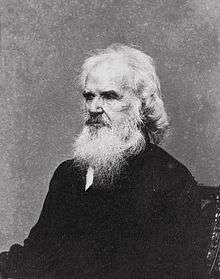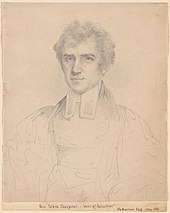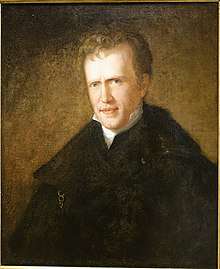John Pierpont
John Pierpont (April 6, 1785 – August 27, 1866) was an American poet, who was also successively a teacher, lawyer, merchant, and Unitarian minister. His most famous poem is The Airs of Palestine.

Overview
Born in 1785 in Litchfield, Connecticut,[1] John Pierpont had careers as a tutor, attorney, merchant, and minister. He graduated from Yale College in 1804. In 1814 he started a dry goods business with his brother in-law Joseph Lord and lifelong friend, John Neal.[2] After a stint in debtor's prison as a result of the failure of the "Pierpont, Lord, and Neal" dry goods store chain in 1815, Pierpont sent his wife and children to live with her family in Connecticut, pawned the family silver, and isolated himself in Baltimore until he had produced “The Airs of Palestine.”[3] Sale of the copyright in 1816 paid for his move to Cambridge, Massachusetts.[4]

Pierpont began his religious work as a theology student in 1816, first in Baltimore and then at Harvard, afterwards accepting an appointment as pastor at the Hollis Street Church in Boston (1819-1845). During his tenure, Pierpont was instrumental in establishing Boston's English Classical School in 1821 and gained national recognition as an educator. He published two of the better-known early school readers in the United States, The American First Class Book (1823) and The National Reader (1827). However, Pierpont's latter years at the Hollis Street Church were characterized by controversy. His social activism for temperance and abolition angered some parishioners, and after a long public battle, he resigned in 1845.
After his resignation, Pierpont served as pastor of a Unitarian church in Troy, New York (1845–1849), and then led the First Parish Church (Unitarian) in Medford, Massachusetts (1849–1856). He ran for Massachusetts governor during the 1840s as a Liberty Party candidate, and in 1850 as a Free Soil Party candidate for the US House of Representatives. After two weeks' service as a 76-year-old military chaplain with the 22nd Massachusetts Volunteer Infantry during the Civil War, Pierpont was given an appointment in the Treasury Department in Washington, which he held from 1861 until his death. He died at Medford, Massachusetts in 1866.
Pierpont's sixteen-page obituary on the front page of the Atlantic Monthly was written by John Neal,[5] his ex-business partner of fifty years earlier who later became an influential critic, writer, and lecturer, and who had named his second-oldest son (John Pierpont Neal) after Pierpont in 1847.[6]
Literary works

Pierpont gained a literary reputation with his book Airs of Palestine: A Poem (1816), re-published in an anthology by the same name in 1840. He also published moral literature, such as Cold Water Melodies and Washingtonian Songster (comp. 1842). In addition, he is probably the anonymous "gentleman" who co-authored The Drunkard; or, The Fallen Saved (1844), attributed to W. H. Smith, an actor and stage manager at Moses Kimball's Boston Museum (theatre). The Drunkard quickly became one of the most popular temperance plays in America.
Pierpont's many published sermons include, among others, The Burning of the Ephesian Letters (1833), Jesus Christ Not a Literal Sacrifice (1834), New Heavens and a New Earth (1837), Moral Rule of Political Action (1839), National Humiliation (1840), and A Discourse on the Covenant with Judas (1842). With publication of Phrenology and the Scriptures (1850), Pierpont became known not only as a reform lecturer, but also as an expert on phrenology and spiritualism.
Pierpont was an important influence on reform-minded antebellum poets. Along with John Greenleaf Whittier’s verse, Pierpont’s poems were frequently recited at public antislavery meetings. Oliver Johnson, a leading antislavery publisher and Garrison associate, published Pierpont’s Anti-Slavery Poems in 1843. The collection contains poems that had appeared mostly in the poetry columns of The Liberator and The National Anti-Slavery Standard. Pierpont’s writings were also anthologized widely in antislavery poetry collections, such as William Allen’s Autographs of Freedom (1853).
John Pierpont did not write the song "Jingle Bells" as erroneously claimed by Robert Fulghum in his collection of essays It Was on Fire When I Lay Down on It (1989). "Jingle Bells" was composed by his son James Lord Pierpont, who lived in Savannah, Georgia, and who was a Confederate soldier during the Civil War, composing songs for the Confederate States of America, including "Our Battle Flag", "Strike for the South", and "We Conquer or Die".
Anti-slavery activity
Pierpont may the called "the poet of the abolition movement". His poem "The Tocsin", written just after the destruction of Pennsylvania Hall (Philadelphia), was published in The Liberator, the country's leading anti-slavery paper.
Genealogy
John Pierpont was also the maternal grandfather of financier J. Pierpont Morgan. For detailed genealogical information, see 20>16232 in "PIERPONT (PIERREPONT[E], PIERPOINT, etc.) GENEALOGIES, With Focus on the New England Pier(re)ponts of America."
Notes
- Samuel Atkins Eliot, Heralds of a liberal faith, Volume 2, American Unitarian Association, 1910, p. 185.
- Sears, Donald A. (1978). John Neal. Boston, Massachusetts: Twayne Publishers. p. 15. ISBN 080-5-7723-08.
- Lease, Benjamin (1972). That Wild Fellow John Neal and the American Literary Revolution. Chicago, Illinois: University of Chicago Press. p. 15. ISBN 0-226-46969-7.
- Neal, John (1869). Wandering Recollections of a Somewhat Busy Life. Boston, Massachusetts: Roberts Brothers. pp. 160–161.
- Neal, John (December 1866). "John Pierpont". Atlantic Monthly. Vol. 18 (July–December 1866). Boston, Massachusetts: Atlantic Monthly Co. pp. 649–665.
- Sears, Donald A. (1978). John Neal. Boston, Massachusetts: Twayne Publishers. p. 12. ISBN 080-5-7723-08.
References
- Neal, John (December 1866). "John Pierpont". Atlantic Monthly. Vol. 18 (July–December 1866). Boston, Massachusetts: Atlantic Monthly Co. pp. 649–665. (Pierpont's obituary)
- Dictionary of American Biography 14: 586-587
- John T. Winterich, "Savonarola of Hollis Street," Colophon 20 (1935)
External links
| Wikiquote has quotations related to: John Pierpont |
| Wikisource has the text of a 1905 New International Encyclopedia article about John Pierpont. |
- The Antislavery Poems of John Pierpont, at the Antislavery Literature Project
- The Tocsin, a broadsheet poem by John Pierpont, at the Antislavery Literature Project
- The Anti-slavery poems of John Pierpont By John Pierpont. Cornell University Library Samuel J. May Anti-Slavery Collection. {Reprinted by}Cornell University Library Digital Collections
- John Pierpont works Cornell University Library Samuel J. May Anti-Slavery Collection
- Yale Obituary Record
- Works by or about John Pierpont at Internet Archive
- Works by John Pierpont at LibriVox (public domain audiobooks)

- John Pierpont at Find a Grave